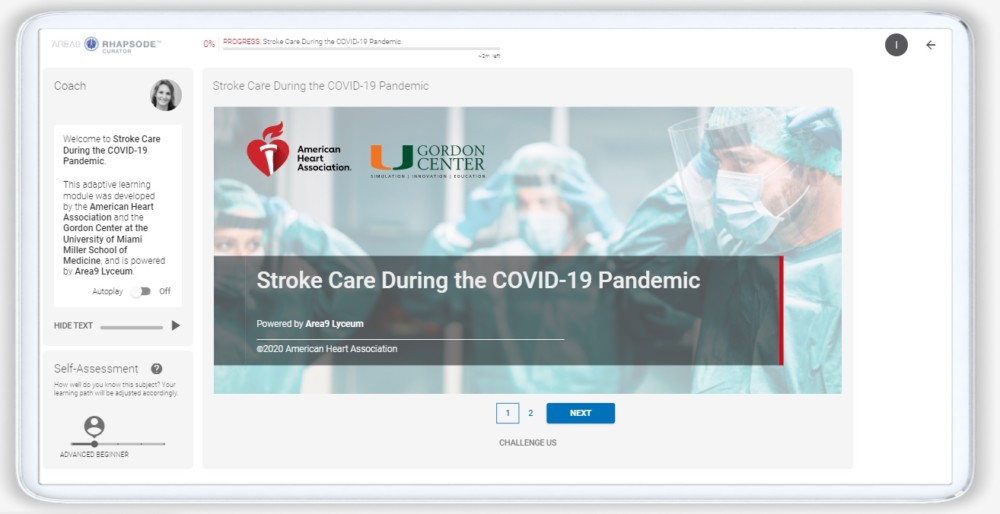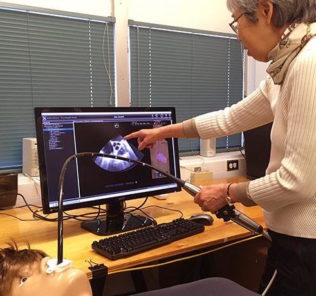Gordon Center Partners with AHA to Offer Online Course: Stroke Care During COVID-19
The Gordon Center for Simulation and Innovation in Medical Education within the University of Miami Miller School of Medicine and the American Heart Association (AHA) — CPR & First Aid have released a new free course, “Stroke Care During the COVID-19 Pandemic.” This course offers healthcare professionals best practices for treating stroke patients during the COVID-19 pandemic directly from The Gordon Center. Guidance regarding the treatment of COVID-19 patients who may be at a greater risk for a stroke due to this diagnosis is also presented by this course.
The AHA created the “Stroke Care During the COVID-19 Pandemic” course to offer education to healthcare providers in response to the need for quality care guidance amid the coronavirus pandemic. This course is designed to educate providers on stroke care with considerations for additional protocols and care practices that should be followed during the pandemic. Learners interested in participating can access the free course from any web browser on the “AHA’s COVID-19 Resources for CPR Training & Resuscitation” webpage.
“A stroke is a very serious condition for patients, and the treatment options are often extremely time-sensitive,” said Ivette Motola, MD, MPH, FACEP, volunteer expert for the American Heart Association, assistant director for the University of Miami Gordon Center for Simulation and Innovation in Medical Education, and medical director of its Advanced Stroke Life Support curricula. “These are challenging times and the rate of strokes has not diminished. Therefore, the goal of this course is to inform and empower healthcare professionals to safely apply evidence-based and guideline-directed care amidst a global pandemic.”
Sponsored Content:
Lasting 30 minutes, the online course gives users the latest science on the overlap between the COVID-19 pandemic and stroke care. Other course topics include the epidemiology of stroke during the COVID-19 pandemic based on the global experience, and the impact of COVID-19 on stroke presentation and management. The course also gives recommendations for systems of care and protocols for stroke during the COVID-19 pandemic. The general approach to optimizing acute and inpatient stroke care during the COVID-19 pandemic is also explained.
“Due to the pandemic, Emergency Departments (EDs) and hospitals were challenged with many sick patients and infection prevention procedures. With conditions as time-sensitive as stroke, we wanted to give healthcare providers the tools to be able to provide timely, evidence-based care safely,” said Ivette Motola, MD, MPH, FACEP, Center Assistant Director and Director, Division of Prehospital & Emergency Training at the Gordon Center for Simulation and Innovation in Medical Education within the University of Miami Miller School of Medicine.
She explained that in areas with large surges of very ill COVID-19 patients, caring for stroke patients can be a challenge. EMS and EDs have been taxed and stretched. Additionally, COVID-19 patients may present with stroke as part of their illness, and stroke patients may have COVID-19, further complicating the provision of safe and effective care. Additionally, patients and families have been afraid to go to hospitals during the pandemic, resulting in delayed stroke presentations.
Stroke Care Virtual Course Details
Sponsored Content:
Any medical professional who wants to learn more about stroke care during the COVID-19 pandemic should consider this course. The subject matter is specifically recommended for professionals who work in a stroke center or see a high volume of COVID-19 patients.
“The course focuses on the care of stroke patients during the pandemic, including those with COVID-19, and provides guidance on approaches to keep patients and healthcare providers safe while still providing high-quality, evidence-based care,” Motola said. “It uses an adaptive platform to assess learner’s baseline knowledge on each of the learning objectives covered in the course, and then provides the content only for the topics not already known.”
This course is made possible by previously announced support from the Leona B. and Harry M. Helmsley Charitable Trust. The AHA and the Helmsley Trust share a desire to quickly deploy targeted training resources to give healthcare professionals the competence and confidence to appropriately treat critical care patients during the COVID-19 crisis.
Initially launched on Nov. 5, the Gordon Center designed the course to get the information out to healthcare providers as soon as possible, given the anticipated and ongoing global surges of COVID-19 patients. To date, Motola says the center has received very positive feedback from hundreds of learners all over the world who have participated in the course. She says they value the targeted and interactive approach the course takes to impart critically-important information.
The Gordon Center Advanced Stroke Life Support (ASLS) curriculum is used worldwide to train thousands of healthcare providers annually in the detection and treatment of stroke patients. The facility has been a long-standing AHA training center, and has had several initiatives based on dissemination of our Advanced Stroke Life Support (ASLS) through Mission Lifeline and other grant-based initiatives.
The “Stroke Care During the COVID-19 Pandemic” virtual course is the first time the Gordon Center and AHA have collaborated on creating a new educational offering. Additional educational courses can be found on AHA’s online course catalog under the “Find a Course” tool. Here, learners can determine the best learning options to fit their training needs.
About The Gordon Center for Research in Medical Education
The Gordon Center is a designated Center of Excellence of the University of Miami Miller School of Medicine. The Center was established more than 45 years ago for the application of advanced technology to medical education for medical students, physicians, physician assistants, nurses, paramedics, firefighters and instructors. More than 2,000 medical centers and agencies worldwide use the educational systems and training curricula developed at the Center.
The Center occupies a 34,000-square-foot state-of-the-art facility, with the capability for simulation and design engineering, production and manufacturing. This facility houses a high-technology auditorium, self-learning laboratory, standardized patient training area, emergency rescue vehicle, car for extrication of trauma victims, disaster response decontamination showers and mock emergency department.
About the American Heart Association
The American Heart Association is the nation’s oldest, largest voluntary organization devoted to fighting cardiovascular diseases. Founded by six cardiologists in 1924, the AHA now includes more than 22.5 million volunteers and supporters working tirelessly to eliminate these diseases. The organization funds innovative research, fights for stronger public health policies and provides tools and information to save and improve lives.
Learn More About the “Stroke Care During the COVID-19 Pandemic” Course
Lance Baily, BA, EMT-B, is the Founder / CEO of HealthySimulation.com, which he started in 2010 while serving as the Director of the Nevada System of Higher Education’s Clinical Simulation Center of Las Vegas. Lance also founded SimGHOSTS.org, the world’s only non-profit organization dedicated to supporting professionals operating healthcare simulation technologies. His co-edited Book: “Comprehensive Healthcare Simulation: Operations, Technology, and Innovative Practice” is cited as a key source for professional certification in the industry. Lance’s background also includes serving as a Simulation Technology Specialist for the LA Community College District, EMS fire fighting, Hollywood movie production, rescue diving, and global travel. He and his wife live with their two brilliant daughters and one crazy dachshund in Las Vegas, Nevada.
Sponsored Content:




















